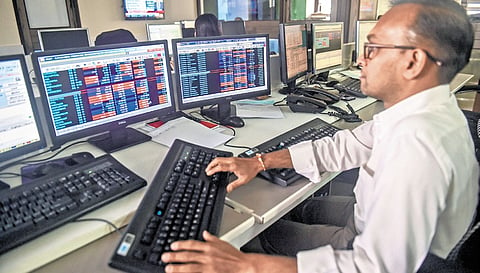

NEW DELHI: The sharp correction in India’s equity market last week has left investors in a turmoil state. Following the total market capitalisation of all BSE listed firms falling more than R 7.5 lakh crore in the single session of Thursday, investors are now worried as to whether they should remain invested in the market or exit until this period of high volatility stabilises once the crucial general election results are out in the first week of June.
India’s equity market benchmarks - BSE Sensex and NSE Nifty- crashed about 2% each last week as the street now fears that a third term for the Prime Minister Narendra Modi-led NDA government may not be as decisive as initially expected. This concern is exaggerated by a lower voter turnout and the domestic market’s premium valuation led to high outflow of funds by foreign institutional investors.
Anirudh Garg, Partner and Fund Manager at Invasset said that the expectations regarding the 2024 general elections result are inherently ambiguous, as they can vary significantly from person to person and from region to region. “However, from a broader market perspective, I believe there would be a positive reception if a stable BJP government were to continue at the centre,” he added.
“I would advise market participants to trade cautiously and consider using systematic investment plans (SIPs) to buy on dips. If the Nifty drops below 20,000, it might be a good opportunity to make a lump sum investment. It’s important to resist the fear of missing out (FOMO) and to avoid making short-term investments. Instead, focus on the long term, keeping a horizon of at least two to three years. Invest in sectors that are experiencing the most significant relative changes. In these volatile markets, it’s wise to avoid speculative trading altogether, particularly staying clear of futures and options,” Garg told TNIE.
Anil Rego, Founder and Fund Manager at Right Horizons said that he is constructive on the domestic macro and believes the capex-driven expansion would likely sustain the growth cycle.
He added that they are less concerned about risks over the domestic macro front and believe shocks are skewed towards exogenous factors. “We recommend investors to hold to quality names that are available at reasonable valuation since we expect this segment will do better supported by healthy sustainable earnings growth.
We anticipate political continuity in the upcoming Lok Sabha Elections ‘24 that is likely to bolster the overall economic momentum and have a positive impact on the market due to continued instrumental policies in key themes,” said Rego. Many market experts too are of the view that this correction gives a good window to accumulate quality stocks, particularly in the banking and FMCG pack. However, they have advised investors to avoid micro and small size stocks which aren’t able to justify their high valuation as they may see a greater correction in the times of volatility.
“Leading private sector banking names, automobile majors and the leading telecom companies are fundamentally strong and fairly valued,” said VK Vijayakumar, Chief Investment Strategist at Geojit Financial Services.
Global cues
One of the key characteristics of the recent dip is how the market was almost entirely dominated by domestic factors (largely the general elections) and there is little sway of global cues which otherwise has a big influence at the moment. Contrary to a crash in the Indian market, US Dow Jones Industrial Average notched a seven-day winning streak on Thursday — its longest since nine days straight of gains
in December as new jobless claims data rekindled hope for Federal Reserve rate cuts later this year. “The market’s decline can be largely attributed to the prevailing uncertainty surrounding the general elections, particularly following the third phase of voting, which witnessed a decrease in voter turnout compared to 2019,” said Arvinder Singh Nanda, Senior VP, of Master Capital Services.
According to Nanda, the outlook for the market this coming week will be guided by the major global and domestic economic data, India’s WPI inflation data and WPI manufacturing data, US PPI data, Core CPI data, Initial Jobless Claims, Core Retail Sales data, Japan’s GDP data, India Q4 company results and speech by Fed Chairman Jerome Powell. Besides the 2% fall in benchmarks, Nifty small-cap and midcap index witnessed a fall of around 5% and 2.75%, respectively. All sectoral indices lost (except Auto and FMCG) on a week-on week basis. Naveen Kulkarni, Chief Investment Officer, Axis Securities PMS, believes that the market correction is a mix of multiple factors and not just driven by political updates.
“At this juncture, we believe that the markets continue to anticipate a stable political regime will ensue...The markets factored in most of the positives from December 2023, so a modest correction seems warranted. This correction is healthy and not primarily driven by pre-election result jitters. Rather, it has more to do with the fundamentals and return expectations for FY25 or 2024, which are getting tapered and becoming more realistic than political jitters,” said Kulkarni.
Market correction (5 sessions)
Sensex 1.84%
Nifty 2.32%
Nifty midcap 2.5%
Nifty smallcap 5%